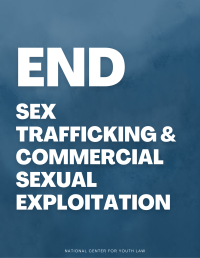In California, There is No Longer Such a Thing as a Child Prostitute
Governor Jerry Brown has signed SB 1322 which will change the landscape for child victims of sex trafficking. By doing so, California has joined the short but growing list of states that affirm there is #NoSuchThing as a child prostitute. Children who are forced to sell sex either by a third party exploiter or even to meet their basic needs such as obtaining food, shelter, and clothing, will no longer be criminalized for their victimization.
Many played a role in this making this legislation a reality. Most critical was the leadership of the survivors themselves, whose advocacy and strength made this momentous accomplishment possible and will change the course of many children's lives in California. It couldn’t have happened without the bold leadership of Senator Holly Mitchell and her office, on behalf of child sex trafficking victims. Other key partners in the advocacy campaign include: WestCoast Children's Clinic, California Welfare Directors Association, Children's Law Center of California, California Alliance of Child and Family Services, Rights4Girls, MISSSEY, Children Now, San Francisco Department on the Status of Women, and the dozens more who produced letters, tweets, and calls on behalf of this bill.
NCYL’s Child Trafficking Team has worked alongside many of these organizations to lay the groundwork for SB 1322. NCYL attorney, Kate Walker Brown was the primary author of the seminal report on trafficking in California, Ending the Commercial Sexual Exploitation of Children: A Call for Multi-System Collaboration in California, which highlighted the intersection of trafficking with child welfare and called for significant changes to better meet the needs of these children. Through this work, NCYL, with the Children’s Law Center of California (CLC), California Department of Social Services, and the Judicial Council, formed the Commercial Sexual Exploitation of Children (CSEC) Action Team, a statewide body charged with implementing recommendations from the report and informing statewide policy related to trafficking. The Action Team, which is staffed by NCYL and CLC, recently formed the Advisory Board to the Action team, a 12-member board comprised of 12 now adult survivors of child sex trafficking. These members play an active role in statewide policy and ensure all guidance is survivor-informed.
Additionally, NCYL along with its partners, pushed for the clarification of the dependency code to make it clear that children who are commercially sexually exploited are victims of child abuse and may be served by the child welfare system. This clarification was coupled with the creation of the CSEC Program, a state-funded program to promote the use of interagency protocols that utilize multidisciplinary teams to identify and serve CSEC. These protocols and this program is the infrastructure needed to serve the children that will no longer be criminalized. NCYL played a significant role in providing guidance to the county through this Toolkit produced by the CSEC Action Team.





